
Aldo Romeo Luigi Moro was an Italian statesman and a prominent member of the Christian Democracy (DC). He served as prime minister of Italy from December 1963 to June 1968 and then from November 1974 to July 1976.

Antonio Segni was an Italian politician and statesman who served as the president of Italy from May 1962 to December 1964 and the prime minister of Italy in two distinct terms between 1955 and 1960.
Amintore Fanfani was an Italian politician and statesman, who served as 32nd prime minister of Italy for five separate terms. He was one of the best-known Italian politicians after the Second World War and a historical figure of the left-wing faction of Christian Democracy. He is also considered one of the founders of the modern Italian centre-left.
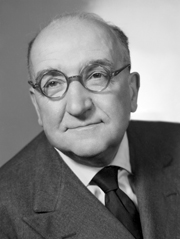
Adone Zoli was an Italian politician who served as the 35th prime minister of Italy from May 1957 to July 1958; he was the first senator to have ever held the office.
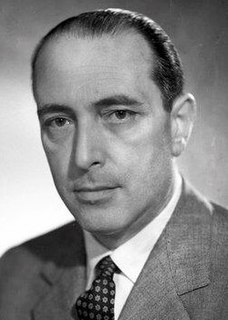
Fernando Tambroni Armaroli was an Italian politician, member of the Christian Democracy, who served as 36th Prime Minister of Italy from March to July 1960. He also served as Minister of the Interior from July 1955 until February 1959, Minister of Budget and Treasury from February 1959 to March 1960 and Minister of the Merchant Navy from August 1953 until July 1955.

Giuseppe Pella was an Italian Christian Democratic politician who served as the 31st prime minister of Italy from 1953 to 1954. He was also Minister of Treasury, Budget and of Foreign Affairs during the 1950s and early 1960s. Pella served as President of the European Parliament from 1954 to 1956 after the death of Alcide De Gasperi.

Gino Paoli is an Italian singer-songwriter. He is a seminal figure who has written a number of songs widely regarded as classics in Italian popular music, including: "Il cielo in una stanza", "Che cosa c'è", "Senza fine", "Quattro amici al bar" and "Sapore di sale".

Ignazio Benito Maria La Russa is an Italian politician who is serving as President of the Senate of the Republic since 13 October 2022. He is the first politician with a neo-fascist background to hold the position of President of the Senate, the second highest-ranking office of the Italian Republic.

The Legislature III of Italy was the 3rd legislature of the Italian Republic, and lasted from 12 June 1958 until 15 May 1963. Its composition was the one resulting from the general election of 25 May 1958.

Brothers of Italy is a national-conservative and right-wing populist political party in Italy led by Giorgia Meloni. As FdI was the largest party in the 2022 Italian general election, Meloni became Prime Minister of Italy—the first woman to serve in the position. According to observers, as the biggest party in the centre-right coalition, FdI marked Italy's first far-right-led government in the republican era and its most right-wing government since World War II.

Luigi Di Maio is a former Italian politician. He served as Minister of Foreign Affairs from 2019 to 2022, as Deputy Prime Minister of Italy and Minister of Economic Development, Labour and Social Policies from 2018 to 2019, and as Vice President of the Chamber of Deputies in the 17th Italian legislature.

Possible is a left-wing political party in Italy, launched in Rome on 21 June 2015. The party's leader is Giuseppe Civati, a former prominent member of the Democratic Party (PD). Possible's progressive platform is a mixture of social democracy, democratic socialism, green politics, liberalism and elements of participatory democracy.
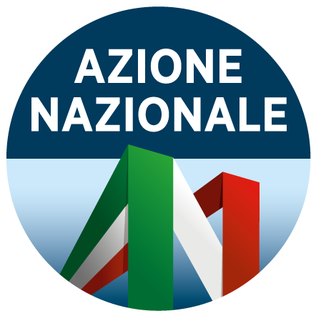
National Action was a conservative political party in Italy.

Carlo Calenda is an Italian business executive and politician. On 10 May 2016, he was appointed Minister of Economic Development in the government of Matteo Renzi and continued in that role in the government of Renzi's successor, Paolo Gentiloni. From 21 March to 10 May 2016, he served as Italy's Permanent Representative to the European Union. He has been serving as a Member of the European Parliament since July 2019.
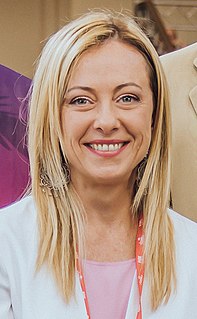
The 2022 Italian general election was a snap election held in Italy on 25 September 2022. After the fall of the Draghi government, which led to a parliamentary impasse, President Sergio Mattarella dissolved the parliament on 21 July, and called for new elections. Regional elections in Sicily were held on the same day. The results of the general election showed the centre-right coalition led by Giorgia Meloni's Brothers of Italy, a radical-right political party with neo-fascist roots, winning an absolute majority of seats in the Italian Parliament. Meloni was appointed Prime Minister of Italy on 22 October, becoming the first woman to hold that position.
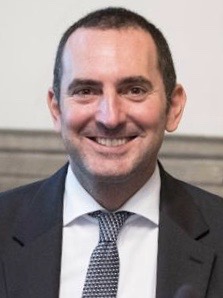
Vincenzo Spadafora is an Italian politician. A member of Together for the Future (IpF) and a former member of the Five Star Movement (M5S), he served as Minister for Youth Policies in the Conte government between 2019 and 2021.
Action is a liberal political party in Italy. Its leader is Carlo Calenda, a member of the European Parliament within the group of Renew Europe and former minister of Economic Development.

Lega, whose official name is Lega per Salvini Premier, is a right-wing populist political party in Italy, led by Matteo Salvini. The LSP is the informal successor of Lega Nord and, while sharing the latter's heartland in northern Italy, it is active all around the country.
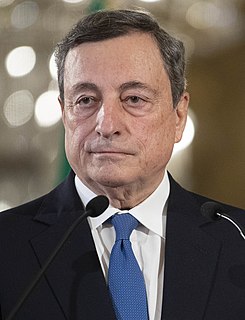
The Draghi government was the 67th government of the Italian Republic, the first led by former President of the European Central Bank, Mario Draghi. It was in office between 13 February 2021 and 22 October 2022.


















